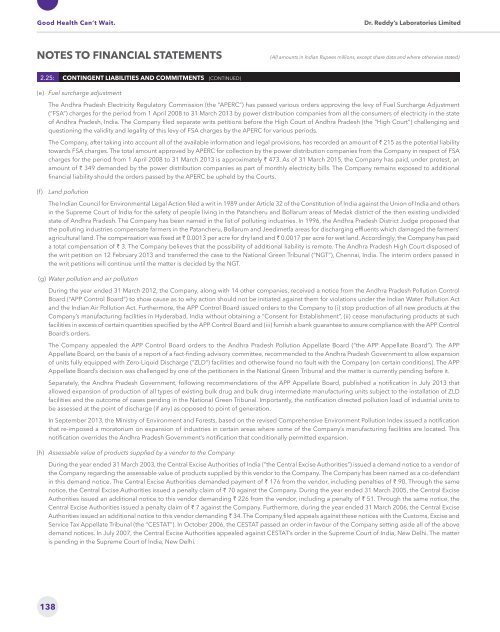Good Health Can’t Wait.
Create successful ePaper yourself
Turn your PDF publications into a flip-book with our unique Google optimized e-Paper software.
<strong>Good</strong> <strong>Health</strong> <strong>Can’t</strong> <strong>Wait</strong>.<br />
Dr. Reddy’s Laboratories Limited<br />
NOTES TO FINANCIAL STATEMENTS<br />
(All amounts in Indian Rupees millions, except share data and where otherwise stated)<br />
2.25: CONTINGENT LIABILITIES AND COMMITMENTS (CONTINUED)<br />
(e) Fuel surcharge adjustment<br />
The Andhra Pradesh Electricity Regulatory Commission (the “APERC”) has passed various orders approving the levy of Fuel Surcharge Adjustment<br />
(“FSA”) charges for the period from 1 April 2008 to 31 March 2013 by power distribution companies from all the consumers of electricity in the state<br />
of Andhra Pradesh, India. The Company filed separate writs petitions before the High Court of Andhra Pradesh (the “High Court”) challenging and<br />
questioning the validity and legality of this levy of FSA charges by the APERC for various periods.<br />
The Company, after taking into account all of the available information and legal provisions, has recorded an amount of ` 215 as the potential liability<br />
towards FSA charges. The total amount approved by APERC for collection by the power distribution companies from the Company in respect of FSA<br />
charges for the period from 1April2008 to 31 March2013 is approximately ` 473. As of 31March2015, the Company has paid, under protest, an<br />
amount of ` 349 demanded by the power distribution companies as part of monthly electricity bills. The Company remains exposed to additional<br />
financial liability should the orders passed by the APERC be upheld by the Courts.<br />
(f) Land pollution<br />
The Indian Council for Environmental Legal Action filed a writ in 1989 under Article 32 of the Constitution of India against the Union of India and others<br />
in the Supreme Court of India for the safety of people living in the Patancheru and Bollarum areas of Medak district of the then existing undivided<br />
state of Andhra Pradesh. The Company has been named in the list of polluting industries. In 1996, the Andhra Pradesh District Judge proposed that<br />
the polluting industries compensate farmers in the Patancheru, Bollarum and Jeedimetla areas for discharging effluents which damaged the farmers’<br />
agricultural land. The compensation was fixed at ` 0.0013 per acre for dry land and ` 0.0017 per acre for wet land. Accordingly, the Company has paid<br />
a total compensation of ` 3. The Company believes that the possibility of additional liability is remote. The Andhra Pradesh High Court disposed of<br />
the writ petition on 12 February 2013 and transferred the case to the National Green Tribunal (“NGT”), Chennai, India. The interim orders passed in<br />
the writ petitions will continue until the matter is decided by the NGT.<br />
(g) Water pollution and air pollution<br />
During the year ended 31 March 2012, the Company, along with 14 other companies, received a notice from the Andhra Pradesh Pollution Control<br />
Board (“APP Control Board”) to show cause as to why action should not be initiated against them for violations under the Indian Water Pollution Act<br />
and the Indian Air Pollution Act. Furthermore, the APP Control Board issued orders to the Company to (i) stop production of all new products at the<br />
Company’s manufacturing facilities in Hyderabad, India without obtaining a “Consent for Establishment”, (ii) cease manufacturing products at such<br />
facilities in excess of certain quantities specified by the APP Control Board and (iii) furnish a bank guarantee to assure compliance with the APP Control<br />
Board’s orders.<br />
The Company appealed the APP Control Board orders to the Andhra Pradesh Pollution Appellate Board (“the APP Appellate Board”). The APP<br />
Appellate Board, on the basis of a report of a fact-finding advisory committee, recommended to the Andhra Pradesh Government to allow expansion<br />
of units fully equipped with Zero-Liquid Discharge (“ZLD”) facilities and otherwise found no fault with the Company (on certain conditions). The APP<br />
Appellate Board’s decision was challenged by one of the petitioners in the National Green Tribunal and the matter is currently pending before it.<br />
Separately, the Andhra Pradesh Government, following recommendations of the APP Appellate Board, published a notification in July 2013 that<br />
allowed expansion of production of all types of existing bulk drug and bulk drug intermediate manufacturing units subject to the installation of ZLD<br />
facilities and the outcome of cases pending in the National Green Tribunal. Importantly, the notification directed pollution load of industrial units to<br />
be assessed at the point of discharge (if any) as opposed to point of generation.<br />
In September 2013, the Ministry of Environment and Forests, based on the revised Comprehensive Environment Pollution Index issued a notification<br />
that re-imposed a moratorium on expansion of industries in certain areas where some of the Company’s manufacturing facilities are located. This<br />
notification overrides the Andhra Pradesh Government’s notification that conditionally permitted expansion.<br />
(h) Assessable value of products supplied by a vendor to the Company<br />
During the year ended 31March2003, the Central Excise Authorities of India (“the Central Excise Authorities”) issued a demand notice to a vendor of<br />
the Company regarding the assessable value of products supplied by this vendor to the Company. The Company has been named as a co-defendant<br />
in this demand notice. The Central Excise Authorities demanded payment of ` 176 from the vendor, including penalties of `90. Through the same<br />
notice, the Central Excise Authorities issued a penalty claim of ` 70 against the Company. During the year ended 31 March 2005, the Central Excise<br />
Authorities issued an additional notice to this vendor demanding ` 226 from the vendor, including a penalty of ` 51. Through the same notice, the<br />
Central Excise Authorities issued a penalty claim of ` 7 against the Company. Furthermore, during the year ended 31 March 2006, the Central Excise<br />
Authorities issued an additional notice to this vendor demanding ` 34. The Company filed appeals against these notices with the Customs, Excise and<br />
Service Tax Appellate Tribunal (the “CESTAT”). In October 2006, the CESTAT passed an order in favour of the Company setting aside all of the above<br />
demand notices. In July 2007, the Central Excise Authorities appealed against CESTAT’s order in the Supreme Court of India, New Delhi. The matter<br />
is pending in the Supreme Court of India, New Delhi.<br />
138



